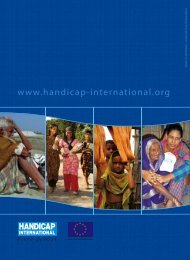Full page photo print - Harvard Law School Project on Disability
Full page photo print - Harvard Law School Project on Disability
Full page photo print - Harvard Law School Project on Disability
Create successful ePaper yourself
Turn your PDF publications into a flip-book with our unique Google optimized e-Paper software.
chAPTeR 12: Access To JUsTice<br />
Un c<strong>on</strong>venti<strong>on</strong> <strong>on</strong> the Rights of Pers<strong>on</strong>s with disabilities<br />
Article 13, Access to Justice:<br />
1. States Parties shall ensure effective access to justice for pers<strong>on</strong>s with disabilities<br />
<strong>on</strong> an equal basis with others, including through the provisi<strong>on</strong> of procedural and ageappropriate<br />
accommodati<strong>on</strong>s, in order to facilitate their effective role as direct and<br />
indirect participants, including as witnesses, in all legal proceedings, including at<br />
investigative and other preliminary stages.<br />
2. In order to help to ensure effective access to justice for pers<strong>on</strong>s with disabilities,<br />
States Parties shall promote appropriate training for those working in the field of<br />
administrati<strong>on</strong> of justice, including police and pris<strong>on</strong> staff.<br />
obJecTives<br />
The exercises and background informati<strong>on</strong> c<strong>on</strong>tained in this chapter will enable participants to<br />
work towards the following objectives:<br />
• Define the right to access to justice<br />
• Explain the importance of equal access to justice for people with disabilities<br />
• Understand the interrelati<strong>on</strong> between access to justice and other human rights<br />
• Identify ways in which the rights of people with disabilities to access justice have been<br />
promoted or denied<br />
• Understand the provisi<strong>on</strong>s <strong>on</strong> access to justice in the UN c<strong>on</strong>venti<strong>on</strong> <strong>on</strong> the Rights of<br />
Pers<strong>on</strong>s with disabilities (CRPD).<br />
geTTing sTARTed: ThinKing AboUT Access To JUsTice<br />
“Access to justice” is a broad c<strong>on</strong>cept, encompassing people’s effective access to the systems,<br />
procedures, informati<strong>on</strong>, and locati<strong>on</strong>s used in the administrati<strong>on</strong> of justice. People who feel<br />
wr<strong>on</strong>ged or mistreated in some way usually turn to their country’s justice system. In additi<strong>on</strong>,<br />
people may be called up<strong>on</strong> to participate in the justice system, for example, as witnesses or<br />
as jurors in a trial. Unfortunately people with disabilities have often been denied fair and equal<br />
treatment before courts, tribunals, and other bodies that make up the justice system in their<br />
country because they have faced barriers to their access. Such barriers not <strong>on</strong>ly limit the ability<br />
of people with disabilities to use the justice system, but also limit their c<strong>on</strong>tributi<strong>on</strong>s to the<br />
administrati<strong>on</strong> of justice.<br />
The ability to access justice is of critical importance in the enjoyment of all other human rights.<br />
For example, a pers<strong>on</strong> with a disability who feels that she or he has been denied the right to<br />
work may wish to turn to the justice system to seek a remedy. However, if the justice system<br />
fails to accommodate their physical, communicati<strong>on</strong>, or other disability-related needs, and/or<br />
expressly discriminates against her or him, then clearly denial of access to the justice system<br />
also results in denial of protecti<strong>on</strong> of the right to work. Similarly, a pers<strong>on</strong> with a disability who<br />
158 hUmAn RighTs. yes! AcTi<strong>on</strong> And AdvocAcy <strong>on</strong> The RighTs of PeRs<strong>on</strong>s wiTh disAbiliTies




